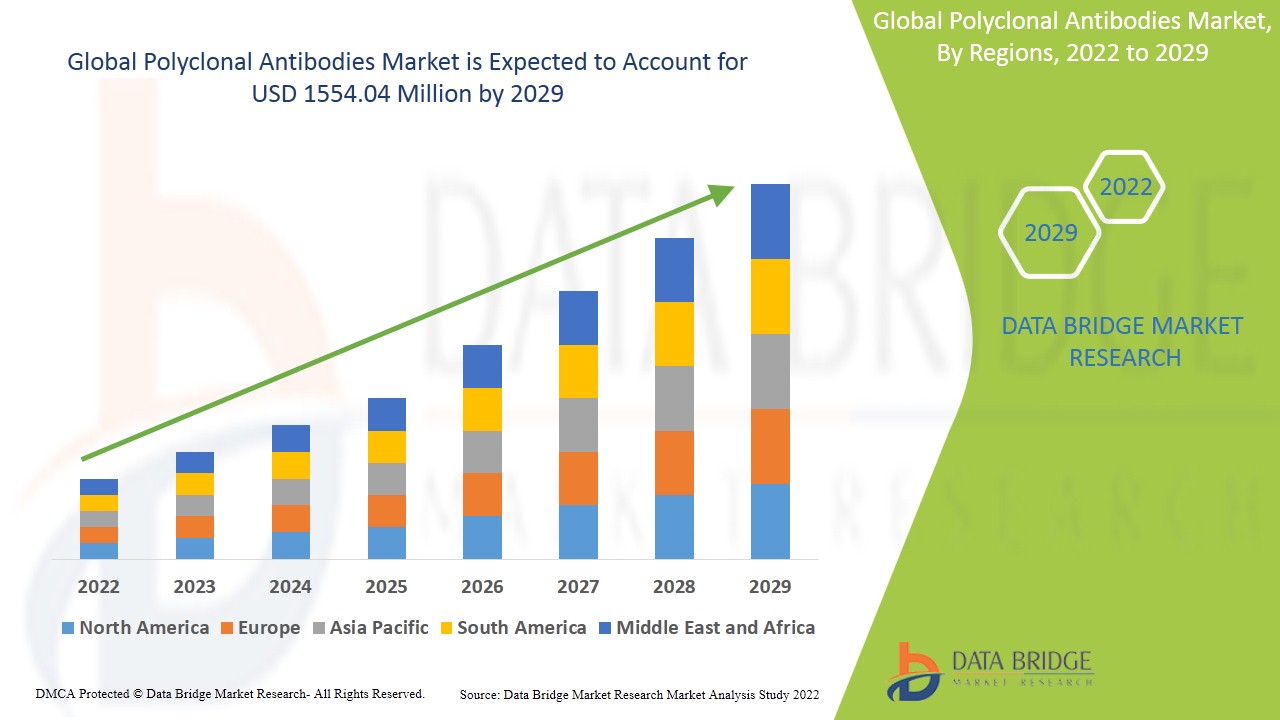Global Polyclonal Antibodies Market
Market Size in USD Billion
CAGR :
% 
 USD
1.17 Billion
USD
1.83 Billion
2024
2032
USD
1.17 Billion
USD
1.83 Billion
2024
2032
| 2025 –2032 | |
| USD 1.17 Billion | |
| USD 1.83 Billion | |
|
|
|
|
Polyclonal Antibodies Market Analysis
There has been immense growth in the pharmaceutical and biotechnology companies over the past few years. The increased research and development activities and the participation of market players in various growth strategies have largely provided growth to the market. Consequently, such growth determinants are projected to show substantial growth over the forecasted period.
Polyclonal Antibodies Market Size
Global polyclonal antibodies market size was valued at USD 1.17 billion in 2024 and is projected to reach USD 1.83 billion by 2032, with a CAGR of 5.70% during the forecast period of 2025 to 2032.
Report Scope and Market Segmentation
|
Attributes |
Polyclonal Antibodies Key Market Insights |
|
Segmentation |
|
|
Countries Covered |
U.S., Canada, Mexico, Germany, Italy, U.K., France, Spain, Netherland, Belgium, Switzerland, Turkey, Russia, Rest of Europe, Japan, China, India, South Korea, Australia, Singapore, Malaysia, Thailand, Indonesia, Philippines, Rest of Asia- Pacific, Brazil, Argentina, Rest of South America, South Africa, Saudi Arabia, UAE, Egypt, Israel, Rest of Middle East and Africa |
|
Key Market Players |
Thermo Fisher Scientific Inc., (U.S.), Merck KGaA (Germany), Abcam plc (UK), BD (U.S.), Bio-Rad Laboratories Inc., (U.S.), Cell Signaling Technology Inc., (U.S.), F. Hoffmann-La Roche Ltd., (Switzerland), Danaher (U.S.), Agilent Technologies (U.S.), PerkinElmer Inc.,(U.S.), Lonza (Switzerland), GenScript (China), BioLegend, Inc. (U.S.), Illumia Inc., (U.S.), ImmonoPresice Antibodies Ltd (Canada), Fujirebio (Sweden), Analytik Jena GmbH (Germany), Omega BioTek Inc.,(U.S.), Dovetail Genomics (U.S.) and Atlas Antibodies (Sweden) |
|
Market Opportunities |
|
Polyclonal Antibodies Market Definition
Polyclonal antibodies are made up of a group of antibodies that represent the body's normal immunological response to an antigen. Repeated immunization of an animal with a chosen antigen is required for polyclonal antibody development. They're a mix of antibodies produced by different B cell lineages. These antibodies are a collection of immunoglobulin molecules that react to a certain antigen and isolate different epitopes on that antigen. Antibodies are often produced by inoculating an appropriate mammal with a virus, such as a rabbit, mouse, or goat. Larger mammals are frequently preferred because they can gather a greater amount of serum. The antigen is injected into the mammal, causing B cells to create immunoglobulin G (IgG) that is specific for that antigen.
Polyclonal Antibodies Market Dynamics
This section deals with understanding the market drivers, opportunities, restraints and challenges. All of this is discussed in detail as below:
Drivers
- Growing Prevalence of Diseases
The global polyclonal antibody market is expected to be driven by an increase in the incidence of infectious diseases and a rise in cancer prevalence, especially across the under developing economies.
Furthermore, the expanding healthcare sector, increase in neurobiology and stem cell research, and the availability of technologically advanced products are also expected to fuel market growth. Moreover, the polyclonal antibodies are highly stable, tolerant of pH and buffer changes which also cushions the market’s growth within the forecasted period. The growing demand for therapeutics antibodies is also projected to bolster the market's growth.
Opportunities
- Growing Research and Development
Moreover, the increase in number of research and development activities across the globe by major pharmaceutical and biotechnology companies are estimated to generate lucrative opportunities for the market.
- Surging Growing Techniques
Additionally, to maintain their positions in the highly competitive market, the companies employ a variety of techniques. Industry leaders in the global polyclonal antibody market use a variety of methods, including partnerships, mergers and acquisitions and collaboration which will further offer numerous growth opportunities for the market.
Restraints/Challenges
- Stringent Regulations
Stringent government regulations and less standard validation process of production are expected to obstruct market growth.
- Low Purity and High Cost
Also, the cost of research antibodies is very high. The factors such as low purity and concentration levels of specific polyclonal antibodies are projected to challenge the polyclonal antibodies market in the forecast period of 2025-2032.
This polyclonal antibodies market report provides details of new recent developments, trade regulations, import-export analysis, production analysis, value chain optimization, market share, impact of domestic and localized market players, analyses opportunities in terms of emerging revenue pockets, changes in market regulations, strategic market growth analysis, market size, category market growths, application niches and dominance, product approvals, product launches, geographic expansions, technological innovations in the market. To gain more info on the polyclonal antibodies market contact Data Bridge Market Research for an Analyst Brief, our team will help you take an informed market decision to achieve market growth.
Polyclonal Antibodies Market Scope
The polyclonal antibodies market is segmented on the basis of product types and application. The growth amongst these segments will help you analyze meagre growth segments in the industries and provide the users with a valuable market overview and market insights to help them make strategic decisions for identifying core market applications.
Product Type
- Primary Antibody
- Secondary Antibody
Application
- Academic Research
- Commercial
Polyclonal Antibodies Market Regional Analysis
The polyclonal antibodies market is analyzed and market size insights and trends are provided by country, product types and application as referenced above.
The countries covered in the polyclonal antibodies market report are U.S., Canada and Mexico in North America, Germany, France, U.K., Netherlands, Switzerland, Belgium, Russia, Italy, Spain, Turkey, Rest of Europe in Europe, China, Japan, India, South Korea, Singapore, Malaysia, Australia, Thailand, Indonesia, Philippines, Rest of Asia-Pacific (APAC) in the Asia-Pacific (APAC), Saudi Arabia, U.A.E, South Africa, Egypt, Israel, Rest of Middle East and Africa (MEA) as a part of Middle East and Africa (MEA), Brazil, Argentina and Rest of South America as part of South America.
North America dominates the polyclonal antibodies market because of the continuous ongoing research and development activities along with the high presence of leading players within the region.
Asia-Pacific is expected to witness significant growth during the forecast period of 2025 to 2032 due to the increasing prevalence of cancer and other diseases along with the growing demand for therapeutics antibodies within the region.
The country section of the report also provides individual market impacting factors and changes in regulation in the market domestically that impacts the current and future trends of the market. Data points like down-stream and upstream value chain analysis, technical trends and porter's five forces analysis, case studies are some of the pointers used to forecast the market scenario for individual countries. Also, the presence and availability of global brands and their challenges faced due to large or scarce competition from local and domestic brands, impact of domestic tariffs and trade routes are considered while providing forecast analysis of the country data.
Polyclonal Antibodies Market Share
The polyclonal antibodies market competitive landscape provides details by competitor. Details included are company overview, company financials, revenue generated, market potential, investment in research and development, new market initiatives, global presence, production sites and facilities, production capacities, company strengths and weaknesses, product launch, product width and breadth, application dominance. The above data points provided are only related to the companies' focus related to polyclonal antibodies market.
Polyclonal Antibodies Market Leaders Operating in the Market Are:
- Thermo Fisher Scientific Inc., (U.S.)
- Merck KGaA (Germany)
- Abcam plc (UK)
- BD (U.S.)
- Bio-Rad Laboratories Inc., (U.S.)
- Cell Signaling Technology Inc., (U.S.)
- F. Hoffmann-La Roche Ltd., (Switzerland)
- Danaher (U.S.)
- Agilent Technologies (U.S.)
- PerkinElmer Inc., (U.S.)
- Lonza (Switzerland)
- GenScript (China)
- BioLegend, Inc. (U.S.)
- Illumia Inc., (U.S.)
- ImmonoPresice Antibodies Ltd (Canada)
- Fujirebio (Sweden)
- Analytik Jena GmbH (Germany)
- Omega BioTek Inc., (U.S.)
- Dovetail Genomics (U.S.)
- Atlas Antibodies (Sweden)
SKU-
Get online access to the report on the World's First Market Intelligence Cloud
- Interactive Data Analysis Dashboard
- Company Analysis Dashboard for high growth potential opportunities
- Research Analyst Access for customization & queries
- Competitor Analysis with Interactive dashboard
- Latest News, Updates & Trend analysis
- Harness the Power of Benchmark Analysis for Comprehensive Competitor Tracking
Research Methodology
Data collection and base year analysis are done using data collection modules with large sample sizes. The stage includes obtaining market information or related data through various sources and strategies. It includes examining and planning all the data acquired from the past in advance. It likewise envelops the examination of information inconsistencies seen across different information sources. The market data is analysed and estimated using market statistical and coherent models. Also, market share analysis and key trend analysis are the major success factors in the market report. To know more, please request an analyst call or drop down your inquiry.
The key research methodology used by DBMR research team is data triangulation which involves data mining, analysis of the impact of data variables on the market and primary (industry expert) validation. Data models include Vendor Positioning Grid, Market Time Line Analysis, Market Overview and Guide, Company Positioning Grid, Patent Analysis, Pricing Analysis, Company Market Share Analysis, Standards of Measurement, Global versus Regional and Vendor Share Analysis. To know more about the research methodology, drop in an inquiry to speak to our industry experts.
Customization Available
Data Bridge Market Research is a leader in advanced formative research. We take pride in servicing our existing and new customers with data and analysis that match and suits their goal. The report can be customized to include price trend analysis of target brands understanding the market for additional countries (ask for the list of countries), clinical trial results data, literature review, refurbished market and product base analysis. Market analysis of target competitors can be analyzed from technology-based analysis to market portfolio strategies. We can add as many competitors that you require data about in the format and data style you are looking for. Our team of analysts can also provide you data in crude raw excel files pivot tables (Fact book) or can assist you in creating presentations from the data sets available in the report.














